Heart and Habits by Greg Gifford is a deeply practical yet unwaveringly theological look at our habits and the heart behind them. Other works, like Mathis’ Habits of Grace, have delved into our spiritual disciplines; Gifford’...
Pastor John’s 2020 Reading Challenge — Year in Review

Well, like everyone else, I started this year with good intentions. And, like everyone else, my intentions didn't amount to much! Thanks, 2020. But seriously, for all its grieving, frustration, and difficulty, there were some pretty solid silver linings this year. For me, reading was one of them. As I've done most years, I utilized Tim Challies' annual reading challenge to spur myself to continue to read both deeply and broadly (read my initial post about this here).
I set a goal to read and review 52 books this year. With increased time at home due to COVID, and a related return to seminary, I ended up—barring an unexpected binge in these final days—with 84 books. Things didn't go quite as well on the reviewing front... I learned about a month ago that my intention of keeping a permanent record of my book reviews on this blog was not to come to fruition, thanks to discovering a character limit heretofore unbeknownst to exist. In other words, my verbosity got the better of me, and my first 25 book reviews vanished into the ether before I realized anything was amiss. So I stopped keeping that list updated... I'll try again in 2021, likely using a different platform.
Anyway, I thought it might be fun to put together some statistics and reflections from my year of reading, along with a top ten list for the year, in case anyone is looking for recommendations for 2021!
By the Numbers
- Total Books Read: 85
- Total Page Count: 30,975
- Works of Fiction: 25
- Works of Non-Fiction: 60
- Books That Were Seminary Assignments: 16
- Books That Were Re-Reads: 16
- Books Read With My Kids: 17
- Books by Female Authors: 12
- Abandoned Books: 4
- Books Over 1000 Pages: 6
- Books Over 100 Years Old: 3
- Books Published in 2019-2020: 23
Reflections and 2021 Goals
My 2020 reading was fairly eclectic, though re-entering seminary definitely weighted my reading toward longer and more academic books. Two goals I'd had for 2020 that did not come to fruition were to read more biographies and classic literature. Both categories ended up taking a backseat to assigned reading. I did finish up a goal from 2019, which was to read several epic fantasy series, wrapping up A Song of Ice and Fire (not recommended) and reading the entirety of The Stormlight Archives (highly recommended). I wanted to read more with my kids—something COVID definitely made easier!—and to read more books by female authors (several of which sadly remain in my to-read pile, though I do think I'll get to them early next year).
For 2021, I plan to again use the Challies 2021 Reading Challenge to guide my reading. It's similarly structured, but with some different categories. Given all that has happened in 2020—and given the focus of the upcoming Transform Conference—I plan to read much more on social justice issues, especially early in the year (I have quite a stack of them ready to go). In particular, I want to read much more from people with opposing viewpoints, so that I can be better equipped for apologetic and evangelistic conversations. The pandemic is obviously still a wildcard, but I suspect I'll once again end up somewhere between "Avid" (52 books) and "Obsessed" (104 books)... though if I avoid some of the huge books but keep the same reading pace, I might hit three digits. We'll see!
Without further ado, here are my top reads from the past year, in alphabetical order because it's so hard to rank books across categories:
The 2020 Top Ten
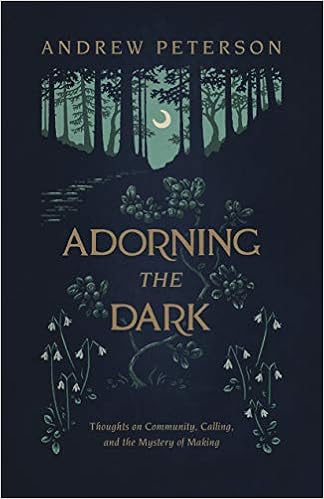
Adorning the Dark: Thoughts on Community, Calling, and the Mystery of Making
by Andrew Peterson
I pre-ordered this book for my wife when she came home from a conference hearing Andrew Peterson (one of our favorite authors) speak on the same content, she she read it first and loved it! It would have made my "best of 2019" list, but though I started it over Christmas break last year, I finished after the new year so here it is. Peterson writes beautifully about the challenges and blessings of creativity, and makes a compelling case that developing creative gifts within the Church is a gospel issue. I couldn't agree more!
Get it here
Alexander Hamilton
by Ron Chernow
Like many others, I bought this book after seeing Hamilton on Disney+ over the summer. I'd heard before it was a great biography worth reading on its own merits, but I was also intensely curious about what kind of mind could read an 800-page biography on his honeymoon and instantly think, this needs to be the first hip-hop Broadway musical. Oh, to get inside the mind of a genius like Lin-Manuel Miranda! Anyway, the biography is great, and made me appreciate the musical adaptation even more.
Get it here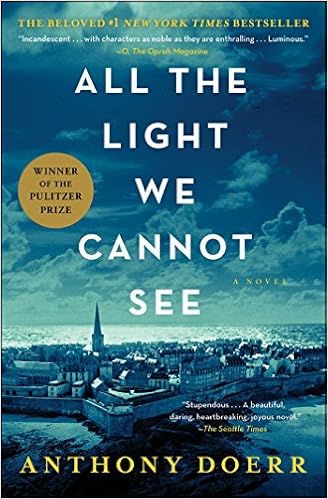
All the Light We Cannot See
by Anthony Doerr
A couple years ago I was on a big historical fiction kick, but I hadn't read any in a while. That's the great thing about lists like Challies'—the inclusion of a historical fiction category gave me a great excuse to go out and find this one. What a beautiful novel! And very original. It's set in France during WWII, alternating chapters between following two teenagers: a blind girl from France and a German orphan recruited into the Wehrmacht. Their paths briefly cross at the book's climax, but mostly this is a story about love, courage, and cruelty in the hardships of war. If you're looking for a war story full of action, this isn't it. But if you love beautiful writing, character development, and grappling with the harsh realities of a broken world, check this one out.
Get it here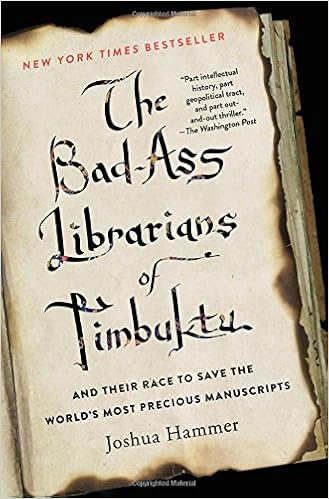
The Bad-[Redacted] Librarians of Timbuktu: And Their Race to Save the World's Most Precious Manuscripts
by Joshua Hammer
Apologies for the colorful language in the book's title (which, while ultimately unnecessary, certainly did grab my attention), but this was such a unique book I wanted to include it here. While parts of the book were a bit monotonous, the actual story is fascinating. I'd heard of the golden age of the Songhai Empire, but didn't really know much about it other than the fact that Timbuktu was once one of the most prosperous cities on the planet. This book explores how a vast trove of sub-Saharan scholarship—the supposed absence of which contributed greatly to the European Enlightenment's justification of African enslavement—only recently came to light, after centuries of being hidden from jihadis and would-be profiteers by librarians across northern Mali. This network of "bad" librarians then had to work quickly to once again smuggle these priceless manuscripts after the 2011 assassination of Muammar Gaddafi drove al-Qaeda and other Islamist terror groups into Timbuktu and the surrounding Magreb, which remains an ongoing and worsening conflict. It's ironic that a book which focuses on "things" should so well personalize the real victims caught in the centuries-long conflict between Western civilization and Islamic terrorism.
Get it here
The Death of Expertise: The Campaign Against Established Knowledge and Why It Matters
by Tom Nichols
There was perhaps no more timely book to read in mid-2020 than this 2018 book about the world's worsening epistemological crisis: How can we know what is true? Nichols examines a number of reasons for the widespread breakdown in trust of institutions of information such as the media, academia, organized religion, and the scientific community. The COVID crisis is Exhibit A for all the problems that are caused by the lack of any reliable, generally accepted source for truth. Very insightful read.
Get it here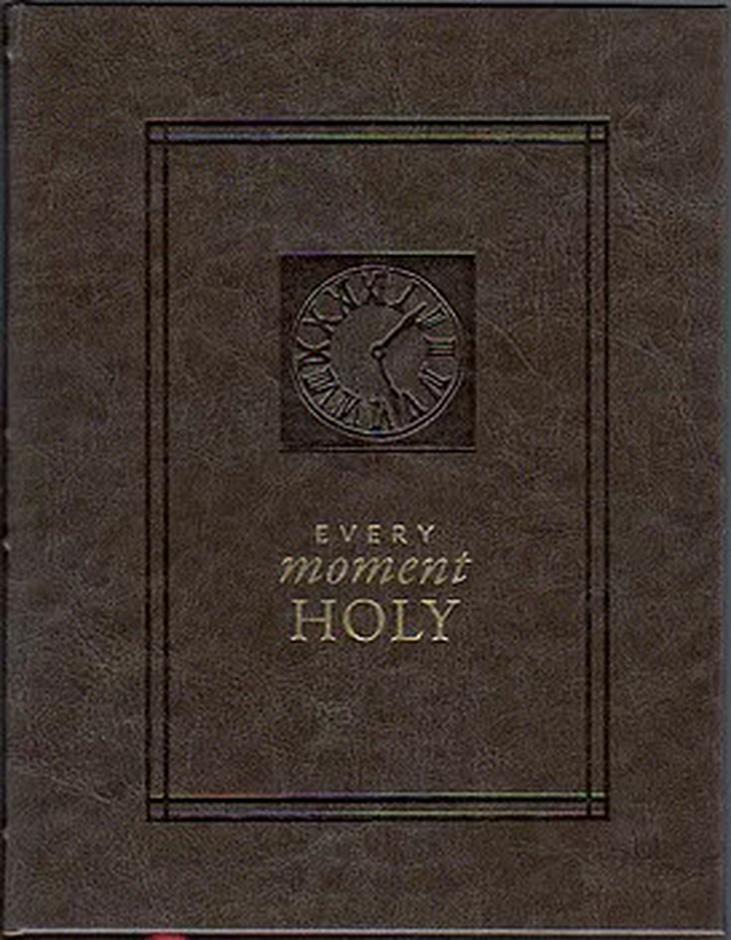
Every Moment Holy
by Douglas McKelvie
It's hard to pick a single favorite, but this might be it. McKelvie has written a series of liturgies for everyday moments in life, with the intent of reminding us that there is not a single moment of our lives in which we are not to give glory to God. These reflections range from the solemn to the poignant to the humorous, but each is written beautifully, and packaged in a beautiful book as well. The book can be read devotionally (cover to cover) or occasionally (i.e, reading liturgies fitting to an occasion). Either way, it will bless you! Also, you can join me in pre-ordering Vol. 2 (which focuses on themes of death, grief, and hope)
Get Vol. 1 herePreorder Vol. 2 here

The Madness of Crowds: Gender, Race, and Identity
by Douglas Murray
I should point out at this point that placing a book on my top 10 list does not suggest endorsement of or agreement with the author's conclusions. Such is the case here. Murray is a secular, British, neoconservative, gay man, giving him a perspective on politics and social issues that is somewhat unique. But while his worldview and philosophical presuppositions are far different from my own, he writes eloquently and persuasively on topics (his chapters are entitled "Gay," "Women," "Race," and "Trans") on which we have some overlapping views. His critique of social justice issues such as Identity Politics, Intersectionality, and cancel culture are worth reading, even though we have very different ideas about the ultimate causes of or solutions to these challenges.
Get it here
Strange Rites: New Religions for a Godless World
by Tara Isabella Burton
Another excellent book written by a non-Christian, I found this study of the functional religions of today's "nones" (those who self-identify as having no religious affiliation; a demographic rapidly approaching majority status among the younger generations) to be absolutely fascinating. In a nation in which participation in organized religion has been plummeting for a half century, Burton argues that Americans are actually becoming more spiritual, rather than less. This spirituality looks quite different from anything the world has ever seen, propelled by new technological realities which offer expressions of faith and community that were previously unimagined. As believers, it is critically important that we understand both the cultural and spiritual trends that are around us and the growing need within our communities for meaning, purpose, and community that are only found in Christ and his Church. This book is very helpful toward that end.
Get it here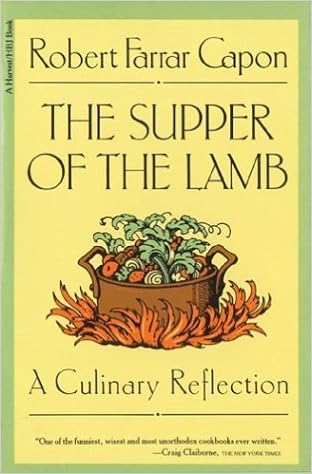
The Supper of the Lamb: A Culinary Reflection
by Robert Farrar Capon
This book is the winner of the "How Have I Never Read This Before?" award for 2020! Now it ranks among my favorite books in my library. While it styles itself a cookbook, it's really not at all about the recipes. Rather, Capon writes eloquently, satirically--and often hilariously--about the immense joy God takes in His own creation, and about how we are meant to enjoy it as well, as we glorify Him for it. Furthermore, eating and cooking are things best enjoyed in community; our efforts to practice hospitality and creativity are a prelude to the feasting we will enjoy with God in eternity. It's a delightful book, and one I highly recommend reading aloud, as Laurie and I did. Our one regret is that we read it just before the COVID shutdown, and have spent the last nine months wanting to host great feasts with friends and neighbors in our home. Just means we'll get to re-read it for further inspiration when the pandemic is behind us!
Get it here
The Way of Kings
by Brandon Sanderson
Really, I could have put all four of the extant books from The Stormlight Archive here, as I thoroughly enjoyed the entire series. But if you're looking for recommendations, this is the one to start with. Sanderson is an incredible writer, whose world-building and character development are among the best I've encountered. I also greatly appreciate the fact that he is able to tell compelling stories in the high fantasy genre without resorting to the gratuitous violence and sexuality that has ruined other series for me, likely due to his LDS background. I highly recommend this series even if you aren't typically a fan of the genre, but if you share my love for Middle Earth and the Potterverse, you'll like this one as well.
Get it hereBooks by Category and Recommendation Rating
Here are all the books I completed in 2020, along with the reading categories from Challies' list. Note that my recommendation rating is not an indication so much of writing quality as it is the extent to which I would recommend the book to most folks who may be looking for recommendations on the church's resource page.
-
A book recommended by someone else A Feast for Crowsby George R.R. Martin 1/5 -
A biography Lafayette in the Somewhat United Statesby Sarah Vowell 2/5 -
A Christian novel On the Edge of the Dark Sea of Darknessby Andrew Peterson 4/5 -
A book targeted at your gender The Masculine Mandate: God's Calling to Menby Richard Phillips 4/5 -
A book about Christian living Every Moment Holyby Douglas McKelvie 5/5 Top Ten Pick -
A book with at least 300 pages A Dance With Dragonsby George R.R. Martin 1/5 -
A book from a "best of 2019" list Adorning the Dark: Thoughts on Community, Calling, and the Mystery of Makingby Andrew Peterson 5/5 Top Ten Pick -
A book more than 150 years old On Christian Teachingby St. Augustine 4/5 -
A biography for children or teens Number the Starsby Lois Lowry 3/5 -
A book of your choice Night Train to Rigelby Timothy Zah 2/5 -
A book about church history Lovin' on Jesus: A Concise History of Christian Worshipby Swee Hong Lim and Lester Ruth 3/5 -
A book written by a Puritan The Pilgrim's Progressby John Bunyan 5/5 -
A book by or about a missionary Neighboring Faiths: A Christian Introduction to World Religionsby Winfried Corduan 5/5 -
A book about theology What is the Gospel?by Greg Gilbert 5/5 -
A book that looks easy to read North! Or Be Eatenby Andrew Peterson 4/5 -
A book published in 2020 Rhythm of Warby Brandon Sanderson 5/5 -
A book on the current New York Times bestseller list Talking to Strangers: What We Should Know About the People We Don't Knowby Malcolm Gladwell 4/5 -
A commentary on a book of the Bible Hear, My Son: Teaching and Learning in Proverbs 1-9by Daniel J. Estes 3/5 -
A book of 100 pages or less How to Help Your Church Livestreamby Paul Richards 2/5 -
A book of your choice The Third Lynxby Timothy Zahn 1/5 -
A book that won an award Gileadby Marilynne Robinson 4/5 -
A book with a person on the cover Rageby Bob Woodward 3/5 -
A book about Christian living Instruments in the Redeemer's Hands: People in Need of Change Helping People in Need of Changeby Paul David Tripp 5/5 -
A book about food or cooking The Supper of the Lamb: A Culinary Reflectionby Robert Farrar Capon 5/5 Top Ten Pick -
A book of your choice Edgedancerby Brandon Sanderson 4/5 -
A book that is of no particular interest to you American Dirtby Jeanine Cummins 3/5 -
A book by or about a celebrity Heroes: The Greek Myths Reimaginedby Stephen Fry 3/5 -
A book of 240 pages or more Harry Potter and the Goblet of Fireby J.K. Rowling 4/5 -
A book by an author who is now deceased Teaching to Change Lives: Seven Proven Ways to Make Your Teaching Come Aliveby Howard Hendricks (4/5) -
A novel by an author you have never read before The Way of Kingsby Brandon Sanderson 5/5 Top Ten Pick -
A book about Christian living Spiritual Disciplines of the Christian Lifeby Donald Whitney 5/5 -
A memoir or autobiography The Bassoon King: Art, Idiocy, and Other Sordid Tales from the Band Roomby Rainn Wilson 3/5 -
A book of your choice Harry Potter and the Order of the Phoenixby J.K. Rowling 4/5 -
A book about theology Strange Rites: New Religions for a Godless Worldby Tara Isabella Burton 4/5 Top Ten Pick -
A book about art or an artist Hamilton: The Revolutionby Lin-Manuel Miranda 4/5 -
A book about holiness Finally Free: Fighting for Purity with the Power of Graceby Heath Lambert 4/5 -
A book you own but have never read Amusing Ourselves to Death: Public Discourse in the Age of Show Businessby Neil Postman 5/5 -
A book targeted at the opposite gender Beholding and Becoming: The Art of Everyday Worshipby Ruth Chou Simons 4/5 -
A book about Christian living Tell the Truth: The Whole Gospel Wholly By Grace Communicated Truthfully & Lovinglyby Will Metzgar 5/5 -
A book of your choice Words of Radianceby Brandon Sanderson 5/5 -
A book by a female author Harry Potter and the Deathly Hallowsby J.K. Rowling 5/5 -
A book with a one-word title Caffeine: How Caffeine Created the Modern Worldby Michael Pollan 3/5 -
A book about church history The Great Evangelical Recession: 6 Factors That Will Crash the American Church... and How to Prepareby John S. Dickerson 4/5 -
A biography of a politician Alexander Hamiltonby Ron Chernow 5/5 Top Ten Pick -
A book of your choice Oathbringerby Brandon Sanderson 5/5 -
A book you think people will still read in 100 years Evangelism and the Sovereignty of Godby J.I. Packer 5/5 -
A book that was on sale What the Dog Saw: And Other Adventuresby Malcolm Gladwell 2/5 -
A book about Christian living Teaching the Faith, Forming the Faithful: A Biblical Vision for Education in the Church 5/5 -
A book about marriage or singleness Tying the Knot: A Premarital Guide to a Strong and Lasting Marriageby Rob Green 5/5 -
A book based or set in Africa The Bad-[Redacted] Librarians of Timbuktu: And Their Race to Save the World's Most Precious Manuscriptsby Joshua Hammer 4/5 Top Ten Pick -
A book you think you ought to read The Talk: 7 Lessons to Introduce Your Child to Biblical Sexualityby Luke Gilkerson 4/5 -
A book of your choice Interview With the Robotby Lee Bacon 2/5 -
A book that seems like it will make you laugh Stranger Planetby Nathan Pyle 5/5 -
A book about evangelism Tactics: A Game Plan for Discussing Your Christian Convictionsby Gregory Koukl 4/5 -
A book by an author you've never heard of Philosophy and Education: An Introduction in Christian Perspectiveby George R. Knight 4/5 -
A book you have read before The Monster in the Hollowsby Andrew Peterson 5/5 -
A historical novel All the Light We Cannot Seeby Anthony Doerr 5/5 Top Ten Pick -
A biography of a non-Christian Genghis Khan and the Making of the Modern Worldby Jack Weatherford 4/5 -
A book about science The Death of Expertise: The Campaign Against Established Knowledge and Why It Mattersby Tom Nichols 5/5 Top Ten Pick -
A book by or about a pastor or pastoring How People Changeby Paul David Tripp 5/5 -
A book about the Bible A Visual Theology Guide to the Bible: Seeing and Knowing God's Wordby Tim Challies and Josh Byers 4/5 -
A book about a controversial subject The Madness of Crowds: Gender, Race, and Identityby Douglas Murray 5/5 Top Ten Pick -
A book published in hard cover Harry Potter and the Half-Blood Princeby J.K. Rowling 4/5 -
A book published by Christian Focus George Muller: Delighted in Godby Roger Steer 5/5 -
A book you think you can finish in a weekend Show Your Work: 10 Ways to Share Your Creativity and Get Discoveredby Austin Kleon 4/5 -
A book of your choice Animal Farmby George Orwell (4/5) -
A book about sin or forgiveness On Guard: Preventing and Responding to Child Abuse at Churchby Deepak Raju 3/5 -
A book about Christian living Overcoming Walls to Witnessingby Timothy Beougher 3/5 -
A book about church history Epic: An Around-the-World Journey Through Christian Historyby Tim Challies 3/5 -
A book about money or finance Find More Money: Increase Your Income to Tackle Debt, Save Wisely, and Live Generouslyby Art Rainer 3/5 -
A book by somebody you think you could be friends with The Ultimate Hitchhiker's Guide to the Galaxyby Douglas Adams 4/5 -
A book by someone from a different continent than you Nut Jobs: Cracking California's Strangest $10 Million Heistby Marc Fennell 2/5 -
A book written by a speaker at Together for the Gospel The Prayer that Turns the World Upside Down: The Lord's Prayer as a Manifesto for Revolutionby Albert Mohler 4/5 -
A book about gender or sexuality Gay Girl, Good God: The Story of Who I Was, and Who God Has Always Beenby Jackie Hill Perry 4/5 -
A book about America or set in America The Long Road to Mercyby David Baldacci 3/5 -
A novel longer than 400 pages The Warden and the Wolf Kingby Andrew Peterson 5/5 -
A book of your choice Treasure Islandby Robert Louis Stevenson 5/5 A book about reading or writing Semicolon: The Past, Present, and Future of a Misunderstood Markby Cecilia Watson 3/5-
A book of comics Strange Planetby Nathan D. Pyle (5/5 -
A book about an interest of yours Mythos: The Greek Myths Reimaginedby Stephen Fry (4/5 -
A book written in the 21st century What's Your Worldview: An Interactive Approach to Life's Big Questionsby James N. Anderson 2/5 -
A book about a city, country, or region The Cricket in Times Squareby George Selden 3/5 -
A book of your choice The Subtle Art of Not Giving a [Redacted]: A Counterintuitive Approach to Living a Good Lifeby Mark Manson 0/5 -
A book published by Crossway The New City Catechism: 52 Questions & Answers for Our Hearts and Mindsby Tim & Kathy Keller 5/5 -
A book of theology Wise Up: 10 Minute Family Devotions in Proverbsby Marty Machowski 4/5

John is the pastor over Music Ministry at Faith Bible Church. He is a coffee aficionado who loves most kinds of music, but has a particular fondness for big band (especially when he's playing trumpet in the band). He and his wife, Laurie, have 3 kids who enjoy reading, hiking, and the symphony.
View Resources by John Gardner
Book by Susan Wojciechowski; Illustrated by P.J. Lynch At the heart of this timeless children’s story is a grieving man, Jonathan Toomey. Known in his community as Mr. Gloomy, he is the best woodcarver in the town: “He wasn’t an old ...

If I was only allowed one book other than my Bible, I would choose The Power of the Gospel, R.C. Sproul’s yearlong devotional on Romans. I have never been so blessed, encouraged, challenged, and had doctrinal topics clarified so helpful...
